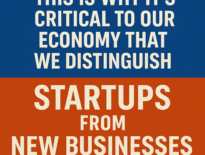
Most startups fail because their founders treat launching a company more like hooking up on Tinder than getting married. It’s all adrenaline, pitch decks, and “minimum viable commitment.” Seriously, we have Speed Dating and Founder Dating…
The reality is that if you planned your startup like people plan their weddings, months of agonizing over details, guest lists, music, and matching your dress to the theme, you’d more likely succeed. But you won’t do that, will you? You want a shotgun startup.
Article Highlights
Weddings Are Startups in Tuxedos
A wedding isn’t just a party. It’s a production, a founding, a public launch, and a brand statement all rolled into one.
- The Dress = Product Branding
You don’t throw on something random and hope your partner, and every attendee, finds you beautiful. No, the dress is researched, tried on, fitted, re-fitted, and accessorized, all BEFORE you step out to Ed Sheeran Thinking Out Loud. In startup terms, this is your product – yes, the blushing bride is the product (bear with me). It must make a statement, feel right to the user, and align with the moment. Sloppy founders launch in jeans and expect users to care. Get your UX tailored. - The Invitations = Go-To-Market Strategy
You don’t invite people to your wedding the day before. You map the list months ahead, send save-the-dates, test different invitation designs, and curate the vibe for your ideal audience. Startups “launch” by dropping a product link on Twitter and praying someone shows up. Like a desperate guy texting “U up?” at 2 AM. Wedding strategy says: plan who, why, and how long before launch. Know your guests (target users), craft the right invite (messaging), and pick the date (timing) with care. - The Guests = Customer Segments & Investors
Every wedding has drama over who’s invited, your ex-girlfriend, that flaky college roommate, or your boss. But the wedding crowd ultimately defines the energy of the day. Startups need to be just as ruthless. Don’t invite (target) everyone. Invite the people who make sense for the stage you’re at: early adopters, beta users, value-aligned investors. Everyone else can watch the wedding reel later. - The Music = Brand Experience
The DJ or band? That’s your user experience. Are you setting the tone, elevating the mood, creating viral moments people want to dance to — “Stay Young, Go Dancing” from Death Cab for Cutie, Etta James with “At Last,” “Then He Kissed Me” – The Crystals, (check this out) “Can’t Stop Your Lovin’” – Poolside (trust me), or are you killing the vibe with features no one asked for? The most unforgettable weddings are immersive. So are the best products. Don’t just build a thing, craft a vibe. - The Reception = Product-Market Fit
You can have a flawless ceremony, but if no one dances at the reception, people leave early and reconnect at ihop because those chocolate chip pancakes are to die for. That’s what happens when startups over-index on launch but never iterate based on feedback. A great reception is one that adapts: play better music, add a second dessert, open the bar earlier. Founders must be willing to tweak the experience once real users show up. Otherwise, they’re all dressed up for a party no one stays at. - Falling in Love = Founder-Market Fit
You don’t marry someone just because it seems like a good idea on paper (unless you’re doing an IPO-level arranged marriage). You fall in love – passionately, irrationally, and with full-body conviction. Founders who are just “dating” their industry won’t last through the hard stuff. True founder-market fit is like knowing you’d marry this problem even if it gained 40 pounds, lost its hair, and kept you up at night sobbing into a pint of debt.
Love Is the Secret Ingredient
Here’s where the metaphor gets deep: You don’t stay married for the tax benefits. You stay because love. Not the Hollywood, candlelit dinner kind of love, but the gritty, let’s-fight-this-out-and-come-back-stronger kind of love. The kind of love that gets up at 3 AM to clean vomit, that forgives stupid mistakes, that puts the other person first, and that clings tight when it would be easier to walk away.
A great startup demands the same. You must love the problem you’re solving so deeply that you never stop caring, even when the solution seems impossible. You must love the customers, not for what they pay you, but because you believe they deserve something better. And you must love your mission with the kind of stubborn, unconditional commitment that doesn’t flinch when growth stalls, investors ghost you, or your cofounder rage-quits over Slack.
That love (obsessive, principled, resilient) is what carries startups through the slog. Because the overnight success story you read about? That was their wedding day. What you didn’t see were the years of marriage counseling, pivot arguments, and bank overdrafts.
So, the Wedding Planner…
Startup founders who try to do it all themselves are like grooms trying to bake the cake, decorate the venue, write the vows, and DJ the night. It’s a trainwreck of sweat, unmet expectations, and forgotten rings. Great founders hire “wedding planners” — mentors, advisors, and accelerators, who know startups work. They prevent disaster, anticipate drama, and make the whole thing look easy.
Here’s the trick to the idea, and why you’re a crappy founder likely to have a failed marriage if you don’t appreciate this… a wedding planner can NOT make your marriage successful. You hire a wedding planner, because they know what you’re doing in having a wedding and they have insight to a successful event and marriage. Too many of you hire a consultant, an advisor, or trust an investor, thinking they’re telling you how you’ll be successful when what they’re doing is preventing disaster, helping you avoid mistakes, and giving you a better shot.
Those of us that have worked in startups for decades have a sentiment we share, “I can’t guarantee your success, and anyone who says they can, needs to be removed from the ecosystem; what I can do is tell if you’re going to fail, and I can help you fix that, but whether or not you listen and put in the work, is on you.”
Marriage as a Startup Model
The best marriages last not because they avoid problems, but because the couple is committed to adapting. They communicate. They do the boring stuff (bills, therapy, in-laws). They keep dating even after the honeymoon ends.
Startup longevity works the same way. It’s not about your Series A, it’s about your tenth product iteration, your third market shift, and your seventh debate over the logo. Great companies stay “married” to the mission, even when it’s messy. They don’t ghost their customers. They show up.
And Love Makes It All Worth It
You won’t survive the early years of your company unless you’re in love with what you’re doing. Not the infatuation of a new app idea, but the sacrificial, relentless, enduring kind of love that grows deeper with every setback. You have to believe — no, know — that your idea matters. That your customers matter. That the world needs what you’re building, and you are the right person to do it.
Because there will be dark days. Breakups. Bankruptcy. Betrayal. Bugs that crash the whole system. And the only thing that can’t be coded or fundraised or accelerated is this: belief born from love.
Love gives you grit. It gives you vision. It keeps you at the table when it would be easier to walk away. It’s why marriages survive heartbreak, and why companies become movements.
Plan Your Startup Like a Wedding, not a One-Night Stand
If you’re launching a startup, take a page from the wedding playbook:
- Don’t just throw something together — design with love and intentionality.
- Know your guests. Invite the right people, not everyone you’ve ever met.
- Hire the right help early. You don’t get bonus points for burnout.
- Think about long-term compatibility, not just short-term excitement.
- Iterate the experience so people want to stay, not sneak out before cake.
- And above all else: love your mission the way you’d love your partner — unconditionally.
Make a Vow:
Planning your startup like a marriage. Raise the bar on how we build. Better commitment. Better planning. More heart. In sickness and in health, for richer or for poorer, till death do us part.
Now go build something worth staying for — and dancing to.



Brilliant analogy and description Paul. I’d say the same
Applies to all projects.
Hilarious yet very resonating 🙂
Great perspective. Please consider the follow on column on “when the love stops….can we still be friends…or at least coexist?”.
Glen Gaddy “They got married and started a new venture. Today on Jerry Springer, we invite 3 investors to find out who really owns this baby.”
Stay Off The Sauce Paul!!! Hope it was a great old Irish Wedding, remember Irish weddings are 3- Day drinking days minimum. Certainly, a unique take, you should check out the otherside (the startup wake)
Relationships – read: successful ones – are hard. They take time, mindfulness, action, compromise, etc. Startups just as much so.
Safe travels my friend. Have fun!
Your approach and analogies are always spot on- safe travels and congrats to the Couple.
I would also add:
– Realism and putting ego aside- the tough work begins dealing with different opinions and the need to be open to different perspectives. SU’s must remain true to guiding principles but also open to changing in market conditions.
– Communication is everything- this is the good and bad and now applies to EEs, Investors, and Customers. You will hit bumps and disasters- expect it and don’t panic and loose your shit- provide transparency and positivity to get through, learn and improve.
I’m in love with analogies. With 90% of startups still failing, with so many founders trying and failing, that’s a mission we can take on – change that. And a great way to do it is to help people see things from different perspectives.
Congratulations to the happy couple!
(I thought it was gonna be way too strained a metaphor. Still I read… and you pulled it off. Well done.)
Paul O’Brien, wow! Given that I celebrated another birthday single yesterday, this is utterly triggering! haha…I jest! Now you must present a version for us solitary monks, also committed to love, resilient and lasting, to self, the purpose and the ethos.
More of building something to last 1000 years and less of building something that Google will buy tomorrow.
Love this analogy! Brings it back to what moves us as people, how we connect and how we make meaning.
Lav Chintapalli a long time in startups makes me fixated on why most fail. The conclusion? Most don’t actually care, they just want.
Agree 1000% To continue the analogy one step, funding = who pays for the wedding. Bootstrapped, generational wealth, investors, debt… This is an important alignment piece, too. Not all funders share the “build to last” vision; some want a quick, flashy Vegas ceremony that gets people talking enough to make their exit before it falls apart (no judgement on actual Vegas weddings, btw).
Enjoy!
Allen Stone raises a good consideration about the moral obligation of ROI
Paul! This is fantastic!! Look forward to meeting you this weekend (sincerely, Liz and John’s wedding planner!)